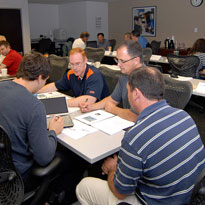GSM, GPRS, EDGE
- Course:GSM, GPRS, EDGE
- Course ID:GSMPLUS Duration:3 days Where: Your Office (7+ Persons)
- Download Course Description (PDF)
Available as a private, customized course for your group at your offices or ours and in some cases as a WebLive(TM) class.
Course Outline
Part 1: GSM Air Operations
- GSM system overview
- The cellular concept and objectives
- GSM architecture and protocols
- 2G, 2.5G, 3G and 4G evolution
- RF signal propagation and range estimation
- Base station (BS) to mobile station (MS) propagation
- Cell frequency reuse analysis and C/I
- Signal penetration into buildings
- Handoff strategies
- Digital modulation and coding for GSM
- ASK, FSK, and PSK modulation analysis
- GMSK properties for GSM use
- Error detection and correction
- Voice and data channel coding in GSM
- Speech coding, complexity, and quality
- GSM speech coding process and receiver performance
- GSM TDMA and physical channels
- Time slots and their use within a frame
- Frame structures and hierarchy
- Physical channels and their properties
- Uplink and downlink timing
- GSM logical channels
- Broadcast channels (BCH): Broadcast control, frequency correction, synchronization
- Common control channels (CCCH): Paging, random access, access grant
- Dedicated control channels (DCCH): Stand-alone dedicated control channels
- Associated control channels (ACCH): Slow and fast
- Traffic control channels (TCH): full rate, half rate, cell broadcast
- GSM burst family: Mapping logical channels to physical channels
- Normal
- Frequency correction
- Synchronization
- Access
- Dummy
- Call process and progression
- GSM location based services (LBS)
- Positioning fundamentals
- Overview of the global positioning system (GPS)
- Cell system positioning
- GSM LBS operation
- GSM reliability and jamming
- Security threats: disclosure, integrity, denial-of-service
- GSM security overview
- GSM vulnerabilities
Part 2: General Packet Radio Service (GPRS)
- Introduction
- GPRS traffic models
- GPRS data services and protocol stack
- GPRS network architecture
- Mobile station modes and classes
- Packet control unit (PCU) and channel codec unit (CCU)
- Serving and gateway nodes
- GPRS protocol structures
- Mobility management and routing
- Mobile station states: Idle, ready, standby
- GPRS medium access control (MAC)
- GPRS radio link control (RLC)
- GPRS logical link control (LLC)
- GPRS on the GSM air interface
- GPRS logical channels
- GPRS multiframe
- Mapping GPRS logical channels to the GSM physical channels
- Error control and retransmission strategies
Part 3: Enhanced Data Rates for GSM Evolution (EDGE)
- Introduction
- Limitations of GPRS
- EDGE traffic models and protocol stack
- EDGE modulation and coding
- Modulation: 8-PSK properties
- Soft decoding
- Hybrid ARQ
- Error detection
- Error correction
- EDGE air interface protocols
- Medium access control (MAC)
- Radio link control (RLC)
- Link adaptation schemes
- Optimization methods
- Course Recap, Discussion, and Evaluations
Course in a Nutshell
The Global System for Mobile communications (GSM) is the world’s dominant wireless technology. This course was designed to be an intensive tutorial of GSM, together with its enhancements, GPRS and EDGE. While the focus of the course is on over-the-air operations, the course can be modified upon request to expand the emphasis placed on the core network issues and to include or exclude certain topics.
Customize It!
We can customize this course, usually at little to no additional cost, to your unique requirements. For instance, the course can be expanded to four or five days for a more in-depth discussion of GSM, GPRS, and EDGE or to include an overview of UMTS and HSPA. The focus of the course can be shifted from the air operations to the mix of topics of interest to your group. The course can also be presented at a less technical level for an audience of non-engineers.
Aimed At
Engineers, technicians, and others who have some existing background in wireless and require an overview of GSM, GPRS, and EDGE, with principal focus on the radio interface.
Prerequisites
Technical background and some prior exposure to wireless communications.
- "Instructor was everything we could have hoped for and more. Very warm and energetic, informative, and concise. It was a great credit to his ability that the class stayed focused through a lot of very technical information. I had expected to lose a few people along the way but that was not the case. He kept everyone intrigued and alert. Now I can easily instruct other team members in their assignments with a good feeling that they have a sound basis and understanding of the subject matter." – Mike Augustis, Sr. Embedded Software Engineer, Lockheed-Martin

